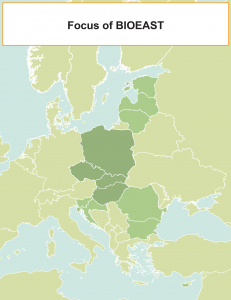Vision for the Central and Eastern European sustainable bioeconomies

Blog - Published 17.4.2019
In 2018 the experts from the responsible ministries in the Visegrad Group (Czech Republic, Hungary, Poland and Slovakia), Bulgaria, Croatia, Romania, Slovenia and the Baltic States (Estonia, Lithuania and Latvia) together with the European Commission representatives agreed on a VISION for the “Central and Eastern European Initiative for Knowledge-based Agriculture, Aquaculture and Forestry in the Bioeconomy” –BIOEAST-.
Through the BIOEAST Initiative, the Central and Eastern European (CEE) ministries set the Vision for 2030 to develop knowledge and cooperation based circular bioeconomies, which helps to enhance their inclusive growth and to create new value-added jobs especially in rural areas, maintaining or even strengthening environmental sustainability.
This model should result in creating jobs, based on the introduction of new value-added processes in the primary production sectors, on innovative solutions and on the development of new value chains in the processing sectors – with a specific attention to the use of bio-based chemicals and materials. However, this vision is under heavy pressure from different challenges and barriers. Investment into research and innovation related to primary production sectors (agriculture, forestry and aquaculture) and to bio-based processing sectors (food – feed, chemical – material use and fuel – energy) are of utmost importance to ensure competitiveness, to find viable solutions for regional challenges. There is an emerging need to develop a macro-regional Strategic Research and Innovation Agenda, as well as national bioeconomy strategies to avoid the deterioration of resources and further societal marginalization.
 Statistics show that the BIOEAST macro-region is a biomass-rich region, with traditionally high importance of primary sectors of agriculture, forestry and fishery. Furthermore, the food industry, bioenergy and biofuels are important bioeconomy sectors in the whole macro-region. However, the unused or under valorized biomass potentials, including the side streams from the sectors, are gradually being recognized. The bio-based pharmaceuticals and chemicals are acknowledged as key sectors, however, they are still small, even though highly productive. Biorefineries are underrepresented in the whole macro-region compared to the rest of the EU.
Statistics show that the BIOEAST macro-region is a biomass-rich region, with traditionally high importance of primary sectors of agriculture, forestry and fishery. Furthermore, the food industry, bioenergy and biofuels are important bioeconomy sectors in the whole macro-region. However, the unused or under valorized biomass potentials, including the side streams from the sectors, are gradually being recognized. The bio-based pharmaceuticals and chemicals are acknowledged as key sectors, however, they are still small, even though highly productive. Biorefineries are underrepresented in the whole macro-region compared to the rest of the EU.
The most important studies show that research and innovation-based growth models are needed based on identified needs and challenges to further develop regional bioeconomies. Instead of exporting raw materials, local companies should start thinking in bioeconomy clusters; invest in local biorefineries, where one can combine the regional feedstock supply with already existing industrial infrastructure, know-how, innovation potential and public support.
 The author Barna Kovacs is the Secretary General of BIOEAST Initiative. He also works as a counsellor at the Permanent Representation of Hungary to the EU. Barna Kovacs is one of the panelists in the European Bioeconomy Scene 2019 -event held in Helsinki on 8 -10 July 2018.
The author Barna Kovacs is the Secretary General of BIOEAST Initiative. He also works as a counsellor at the Permanent Representation of Hungary to the EU. Barna Kovacs is one of the panelists in the European Bioeconomy Scene 2019 -event held in Helsinki on 8 -10 July 2018.
Published on 17 April 2019.

